- Home
- Tom Stoppard
Tom Stoppard Plays 3
Tom Stoppard Plays 3 Read online
TOM STOPPARD
Plays Three
A Separate Peace
Teeth
Another Moon Called Earth
Neutral Ground
Professional Foul
Squaring the Circle
Introduced by the author
CONTENTS
Title Page
Introduction
A Separate Peace
Characters
First Performance
Scene 1
Scene 2
Scene 3
Scene 4
Scene 5
Scene 6
Scene 7
Scene 8
Scene 9
Scene 10
Scene 11
Scene 12
Scene 13
Scene 14
Scene 15
Scene 16
Scene 17
Scene 18
Scene 19
Teeth
Characters
First Performance
Teeth
Another Moon Called Earth
Characters
First Performance
1
2
3
4
5
6
7
8
9
10
11
12
13
14
15
Neutral Ground
Characters
First Performance
1
2
3
4
5
6
7
8
9
10
11
12
13
14
15
16
17
18
19
20
21
22
23
24
25
26
27
28
29
30
31
32
33
34
35
36
37
38
39
40
41
42
43
44
45
46
47
48
49
50
51
52
53
54
55
56
57
58
59
60
61
62
63
64
65
66
67
68
69
70
71
72
73
74
75
76
77
78
79
80
81
82
83
84
85
86
87
88
89
90
91
92
93
Professional Foul
Dedication
Characters
First Performance
1
2
3
4
5
6
7
8
9
10
11
12
13
14
15
16
Squaring the Circle
Characters
First Performance
1: The First Secretary
1
2
3
4
5
6
7
8
9
10
11
12
13
14
15
16
17
18
19
20
21
22
23
24
25
26
27
28
29
2: Solidarity
30
31
32
33
34
35
36
37
38
39
40
41
42
43
44
45
46
47
48
49
50
51
52
53
54
55
56
57
58
59
60
61
62
63
64
3: Congress
65
66
67
68
69
70
71
72
73
74
75
76
77
78
79
80
81
82
83
84
85
86
87
88
89
90
91
92
93
94
95
96
97
4: The General
98
99
100
101
102
103
104
105
106
107
108
109
110
111
112
113
114
115
116
117
118
119
120
121
122
About the Author
By the Same Author
Copyright
INTRODUCTION
These six plays for television span nearly twenty years, but not evenly. The first four were written close together (1965–7); Professional Foul followed after a ten-year gap, and Squaring the Circle seven years after that. My case history as a writer for television understates my interest in plays on screen but is fair comment otherwise. I wanted to be in the theatre. The first play I wrote, in 1960, was meant for the stage, and the next plays, for radio and TV, were – I hoped – stepping stones towards getting a play on the boards. 1967, the beginning of the ten-year gap, was the year of my first professional stage production in England.
This is not a philosophical claim for the value of one medium over another. It is simply the way I felt, and there were many like me in those early Osborne, Wesker and Pinter years, when bliss was it to be performed but to be staged was very heaven.
A Separate Peace was one half of an hour-long programme consisting of a documentary and a play which were supposed to illuminate each other. The documentary (which I made with Christopher Martin) was about chess. I now doubt that chess and the desire to escape from the world are good metaphors for each other.
Teeth, a Roald Dahl-type story (as I hoped), I take this opportunity to dedicate to my much more recent and much nicer dentist. Another Moon Call
ed Earth contributed a good deal to Jumpers: a woman who won’t get out of bed, a husband working in the next room, a death, a visiting detective. Penelope in this play pushes someone out of the window and I began Jumpers thinking that Dottie was going to be the murderer of McFee.
Neutral Ground is based on Philoctetes by Sophocles. It was written for a proposed Granda TV series based on myths and legends. The series never happened but three years later the play was taken off the shelf and transmitted on its own, the only vestige of its original inspiration being the hero’s egregious name of Philo.
Leaving aside weightier matters, Professional Foul serves as a good example of the concealed difficulty in the most-asked question: ‘How long does it take to write?’ When does one start counting? I had promised to deliver a play by the last day of 1976 to mark Amnesty International’s Prisoner of Conscience Year (1977). On that day, after months of trying, I had nothing to show, nothing begun and nothing in mind. A visit to the USSR (not Czechoslovakia) finally produced a ghost of a plot, and after that the play was written in two or three weeks, including turning a ballroom dancing team into the England Football squad.
By comparison, the writing, rewriting, production and post-production troubles of Squaring the Circle were an endless saga (described in the Introduction to the play’s first publication). Whether it is a play at all, rather than a drama-documentary, is a question, through perhaps not a vital one.
T.S. 1993
A SEPARATE PEACE
CHARACTERS
JOHN BROWN
NURSE
DOCTOR
NURSE MAGGIE COATES
MATRON
NURSE JONES
A Separate Peace was first transmitted in August 1966 by the BBC. The cast included:
JOHN BROWN Peter Jeffrey
NURSE MAGGIE COATES Hannah Gordon
DOCTOR Ronald Hines
PRODUCER Ronald Mason
DIRECTOR Alan Gibson
SCENE 1
The office of the Beechwood Nursing Home. Behind the reception counter sits a uniformed nurse. It is 2.30 a.m. A car pulls up outside. JOHN BROWN enters. He is a biggish man, with a well-lined face: calm, pleasant. He is wearing a nondescript suit and overcoat, and carrying two zipped travelling bags. Looking around, he notes the neatness, the quiet, the flowers, the nice nurse, and is quietly pleased.
BROWN: Very nice.
NURSE: Good evening …
BROWN: ’Evening. A lovely night. Morning.
NURSE: Yes … Mr …?
BROWN: I’m sorry to be so late.
NURSE: (Shuffling papers) Were you expected earlier?
BROWN: No. I telephoned.
NURSE: Yes?
BROWN: Yes, You have a room for Mr Brown.
NURSE: Oh! – Have you brought him?
BROWN: I brought myself. Got a taxi by the station. I telephoned from there.
NURSE: You said it was an emergency.
BROWN: That’s right. Do you know what time it is?
NURSE: It’s half-past two.
BROWN: That’s right. An emergency.
NURSE: (Aggrieved) I woke the house doctor.
BROWN: A kind thought. But it’s all right. Do you want me to sign in?
NURSE: What is the nature of your emergency, Mr Brown?
BROWN: I need a place to stay.
NURSE: Are you ill?
BROWN: No.
NURSE: But this is a private hospital …
(BROWN smiles for the first time.)
BROWN: The best kind. What is a hospital without privacy? It’s the privacy I’m after – that and the clean linen … (A thought strikes him.) I’ve got money.
NURSE: … the Beechwood Nursing Home.
BROWN: I require nursing. I need to be nursed for a bit. Yes. Where do I sign?
NURSE: I’m sorry, but admissions have to be arranged in advance except in the case of a genuine emergency – I have no authority –
BROWN: What do you want with authority? A nice person like you.
(Moves.) Where have you put me?
NURSE: (Moves with him) And you have no authority –
BROWN: (Halts) That’s true. That’s one thing I’ve never had.
(He looks at her flatly.) I’ve come a long way.
NURSE: (Wary) Would you wait for just one moment?
BROWN: (Relaxes) Certainly. Have you got a sign-in book? Must abide by the regulations. Should I pay in advance?
NURSE: No, that’s quite all right.
BROWN: I’ve got it – I’ve got it all in here –
(He starts trying to open one of the zipped cases, it jams and he hurts his finger. He recoils sharply and puts his finger in his mouth. The DOCTOR arrives, dishevelled from being roused.)
NURSE: Doctor – this is Mr Brown.
DOCTOR: Good evening. What seems to be the trouble?
BROWN: Caught my finger.
DOCTOR: May I see?
(BROWN holds out his finger. The DOCTOR studies it, looks up.)
(Guardedly.) Have you come far?
BROWN: Yes. I’ve been travelling all day.
(The DOCTOR glances at the NURSE.)
Not with my finger. I did that just now. Zip stuck.
DOCTOR: Oh. And what – er –
NURSE: Mr Brown says there’s nothing wrong with him.
BROWN: That’s right – I –
NURSE: He just wants a bed.
BROWN: A room.
DOCTOR: But this isn’t a hotel.
BROWN: Exactly.
DOCTOR: Exactly what?
BROWN: I don’t follow you.
DOCTOR: Perhaps I’m confused. You see, I was asleep.
BROWN: It’s all right. I understand. Well, if someone would show me to my room, I shan’t disturb you any further.
DOCTOR: (With a glance at the NURSE) I don’t believe we have any rooms free at the moment.
BROWN: Oh yes, this young lady arranged it.
NURSE: He telephoned from the station. He said it was an emergency.
DOCTOR: But you’ve come to the wrong place.
NURSE: No, this is the place all right. What’s the matter?
DOCTOR: (Pause) Nothing – nothing’s the matter. (He nods at the NURSE.) All right.
NURSE: Yes, doctor. (Murmurs worriedly.) I’ll have to make an entry.
DOCTOR: Observation.
BROWN: (Cheerfully) I’m not much to look at.
NURSE: Let me take those for you, Mr Brown [the cases].
BROWN: No, no, don’t you. (Picks up cases.) There’s nothing the matter with me …
(BROWN follows the NURSE inside. The DOCTOR watches them go, picks up Brown’s form and reads it. Then he picks up the phone and starts to dial.)
SCENE 2
Brown’s private ward. A pleasant ward with a hospital bed and the usual furniture. One wall is almost all window and is curtained. BROWN and NURSE enter. BROWN puts his cases on the bed. He likes the room.
BROWN: That’s nice. I’ll like it here. (Peering through curtains)
What’s the view?
NURSE: Well, it’s the drive and the gardens.
BROWN: Gardens. A front room. What could be nicer?
(NURSE starts to open case.)
NURSE: Are your night things in here?
BROWN: Yes, I’ll be very happy here.
(NURSE opens the case, which is full of money – banknotes.)
NURSE: Oh – I’m sorry –
(BROWN is not put out at all.)
BROWN: What time is breakfast?
NURSE: Eight o’clock.
BROWN: Lunch?
NURSE: Twelve o’clock.
BROWN: Tea?
NURSE: Three o’clock.
BROWN: Supper?
NURSE: Half-past six.
BROWN: Cocoa?
NURSE: Nine.
BROWN: Like clockwork. Lovely.
(The DOCTOR enters with Brown’s form and an adhesive bandage.)
DOCTOR: Excuse me.
BROW
N: I was just saying – everything’s A1.
DOCTOR: I remembered your finger.
BROWN: I’d forgotten myself. It’s nothing.
DOCTOR: Well, we’ll just put this on overnight.
(He puts on the adhesive strip.)
I expect Matron will be along to discuss your case with you tomorrow.
BROWN: My finger?
DOCTOR: … Well, I expect she’d like to meet you.
BROWN: Be pleased to meet her.
SCENE 3
The hospital office. It is morning and the DOCTOR is at the desk, telephoning.
DOCTOR: … I have absolutely no idea … The nurse said it looked like rather a lot … His savings, yes. No, I don’t really want the police turning up at the bedside of any patient who doesn’t arrive with a life history … I think we’d get more out of him than you would, given a little time … No, he’s not being difficult at all … You don’t need to worry about that – he seems quite happy …
SCENE 4
Brown’s private ward. BROWN is in striped pyjamas, eating off a tray. A second nurse – NURSE COATES (MAGGIE) – is waiting for him to finish so that she can take his tray away. MAGGIE is pretty and warm.
BROWN: The point is not breakfast in bed, but breakfast in bed without guilt – if you’re not ill. Lunch in bed is more difficult, even for the rich. It’s not any more expensive, but the disapproval is harder to ignore. To stay in bed for tea is almost impossible in decent society, and not to get up at all would probably bring in the authorities. But in a hospital it’s not only understood – it’s expected. That’s the beauty of it. I’m not saying it’s a great discovery – it’s obvious really – but I’d say I’d got something.
MAGGIE: If you’d got something, there wouldn’t be all this fuss.
BROWN: Is there a fuss?
(MAGGIE doesn’t answer.)
I’m paying my way … Are you pretty full all the time?
MAGGIE: Not at the moment, not very.
BROWN: You’d think a place as nice as this would be very popular.
MAGGIE: Popular?
BROWN: I thought I might have to wait for a place, you know.
MAGGIE: Where do you live?
BROWN: I’ve never lived. Only stayed.
MAGGIE: You should settle down somewhere.
BROWN: Yes, I’ve been promising myself this.
MAGGIE: Have you got a family?
BROWN: I expect so.
MAGGIE: Where are they?
BROWN: I lost touch.
MAGGIE: You should find them.
BROWN: (Smiles) Their name’s Brown.
(The MATRON enters: she is not too old and quite pleasant.)
MATRON: Good morning.
BROWN: Good morning to you. You must be Matron.
MATRON: That’s right.

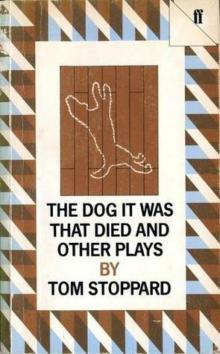 The Dog It Was That Died and Other Plays
The Dog It Was That Died and Other Plays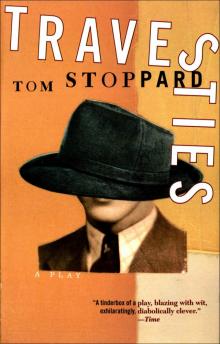 Travesties
Travesties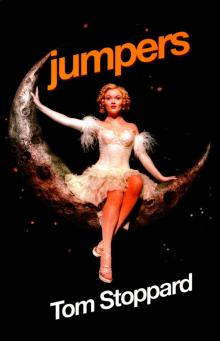 Jumpers
Jumpers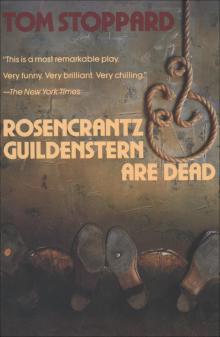 Rosencrantz and Guildenstern Are Dead
Rosencrantz and Guildenstern Are Dead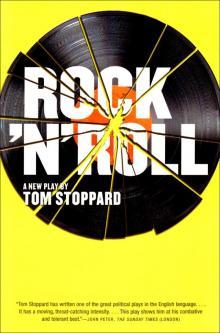 Rock 'N' Roll
Rock 'N' Roll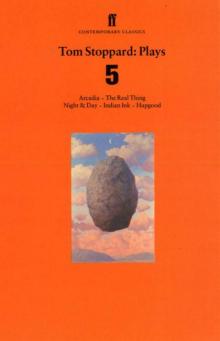 Plays 5
Plays 5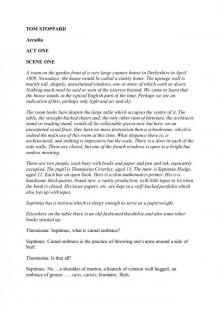 Arcadia
Arcadia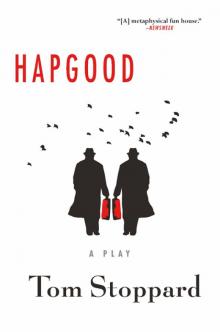 Hapgood
Hapgood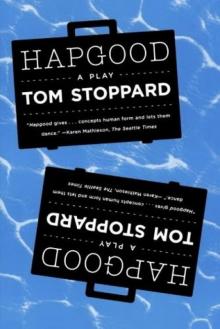 Hapgood: A Play
Hapgood: A Play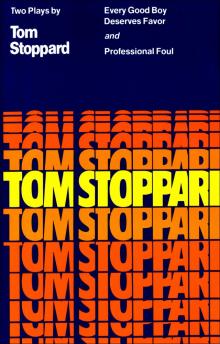 Every Good Boy Deserves Favor & Professional Foul
Every Good Boy Deserves Favor & Professional Foul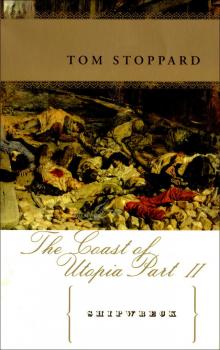 The Coast of Utopia: Voyage, Shipwreck, Salvage
The Coast of Utopia: Voyage, Shipwreck, Salvage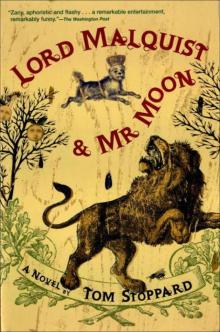 Lord Malquist & Mr. Moon
Lord Malquist & Mr. Moon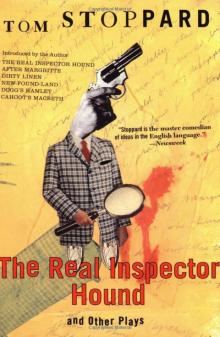 The Real Inspector Hound and Other Plays
The Real Inspector Hound and Other Plays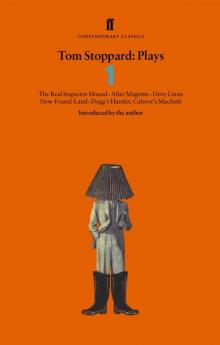 Tom Stoppard Plays 1
Tom Stoppard Plays 1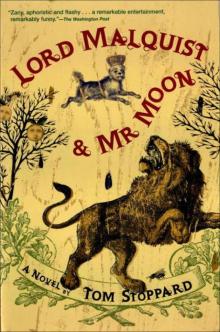 Lord Malquist & Mr. Moon: A Novel
Lord Malquist & Mr. Moon: A Novel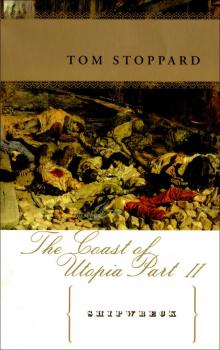 Shipwreck
Shipwreck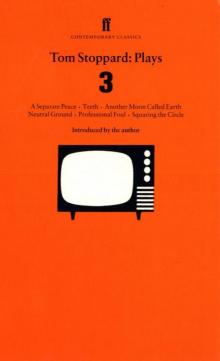 Tom Stoppard Plays 3
Tom Stoppard Plays 3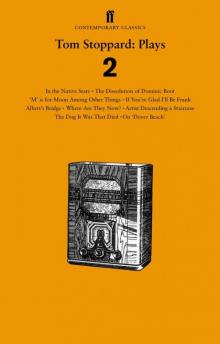 Tom Stoppard Plays 2
Tom Stoppard Plays 2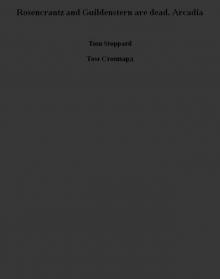 Rosencrantz and Guildenstern are dead. Arcadia
Rosencrantz and Guildenstern are dead. Arcadia